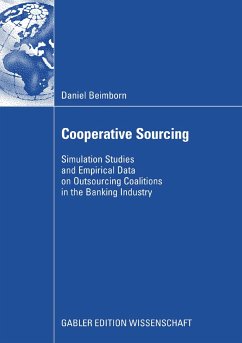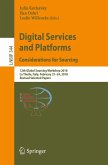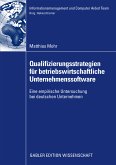More and more banks are deciding to merge business activities like payment processing or loans administration by founding joint transaction banks or credit factories. But under which circumstances will banks decide to outsource certain activities? What are the relevant drivers and inhibitors? What is the role of externalities and how can stable coalitions be established? What are the resulting market structure effects of cooperative sourcing activities? Based on the integration of relevant economic and organizational theories, Daniel Beimborn develops a formal model of cooperative sourcing. The model captures the different drivers and inhibitors like economies of scale, scope and skill, transaction costs, strategic constraints etc. and forms the basis for both game-theoretical analyses and agent-based simulations. Simulations help to handle the numerical complexity and allow for compound analyses of the causes and effects of cooperative sourcing. Empirical data from two large-scale surveys and case studies in the German credit business are used in order to feed the simulation model and to validate the results. This book is essential reading for researchers and students in the fields of business and information systems. It is also of interest to executives in the area of information systems and outsourcing. Its originality, its attention to detail, its level of sophistication, its comprehensiveness, its coherence, and its richness makes this an excellent example of what the IS field needs far more of: applied research which ties together the best of what academics can offer with sound practical results. Prof. Dr. Dr. h. c. Rudy Hirschheim Baton Rouge, September 8, 2007
Dieser Download kann aus rechtlichen Gründen nur mit Rechnungsadresse in A, B, BG, CY, CZ, D, DK, EW, E, FIN, F, GR, HR, H, IRL, I, LT, L, LR, M, NL, PL, P, R, S, SLO, SK ausgeliefert werden.
Hinweis: Dieser Artikel kann nur an eine deutsche Lieferadresse ausgeliefert werden.









